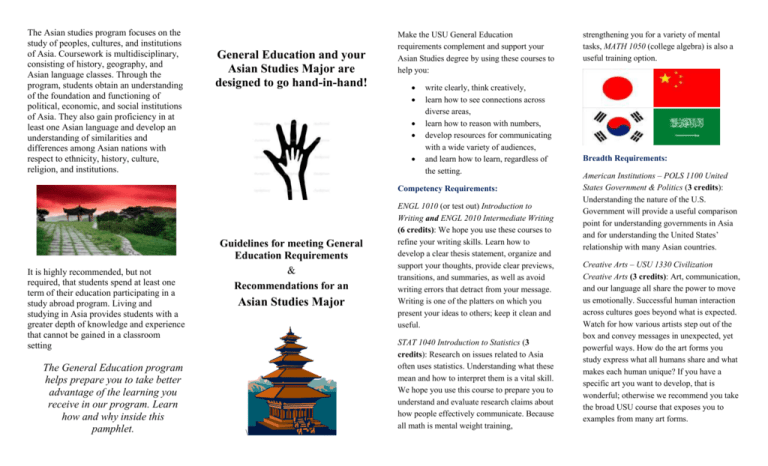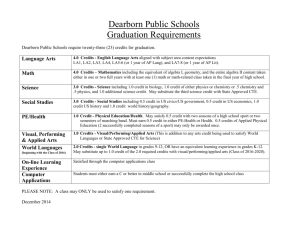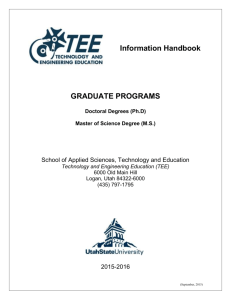Recommendations for an Asian Studies Major
advertisement

The Asian studies program focuses on the study of peoples, cultures, and institutions of Asia. Coursework is multidisciplinary, consisting of history, geography, and Asian language classes. Through the program, students obtain an understanding of the foundation and functioning of political, economic, and social institutions of Asia. They also gain proficiency in at least one Asian language and develop an understanding of similarities and differences among Asian nations with respect to ethnicity, history, culture, religion, and institutions. General Education and your Asian Studies Major are designed to go hand-in-hand! Make the USU General Education requirements complement and support your Asian Studies degree by using these courses to help you: write clearly, think creatively, learn how to see connections across diverse areas, learn how to reason with numbers, develop resources for communicating with a wide variety of audiences, and learn how to learn, regardless of the setting. Competency Requirements: It is highly recommended, but not required, that students spend at least one term of their education participating in a study abroad program. Living and studying in Asia provides students with a greater depth of knowledge and experience that cannot be gained in a classroom setting The General Education program helps prepare you to take better advantage of the learning you receive in our program. Learn how and why inside this pamphlet. Guidelines for meeting General Education Requirements & Recommendations for an Asian Studies Major \ ENGL 1010 (or test out) Introduction to Writing and ENGL 2010 Intermediate Writing (6 credits): We hope you use these courses to refine your writing skills. Learn how to develop a clear thesis statement, organize and support your thoughts, provide clear previews, transitions, and summaries, as well as avoid writing errors that detract from your message. Writing is one of the platters on which you present your ideas to others; keep it clean and useful. STAT 1040 Introduction to Statistics (3 credits): Research on issues related to Asia often uses statistics. Understanding what these mean and how to interpret them is a vital skill. We hope you use this course to prepare you to understand and evaluate research claims about how people effectively communicate. Because all math is mental weight training, strengthening you for a variety of mental tasks, MATH 1050 (college algebra) is also a useful training option. Breadth Requirements: American Institutions – POLS 1100 United States Government & Politics (3 credits): Understanding the nature of the U.S. Government will provide a useful comparison point for understanding governments in Asia and for understanding the United States’ relationship with many Asian countries. Creative Arts – USU 1330 Civilization Creative Arts (3 credits): Art, communication, and our language all share the power to move us emotionally. Successful human interaction across cultures goes beyond what is expected. Watch for how various artists step out of the box and convey messages in unexpected, yet powerful ways. How do the art forms you study express what all humans share and what makes each human unique? If you have a specific art you want to develop, that is wonderful; otherwise we recommend you take the broad USU course that exposes you to examples from many art forms. Humanities – RELS 1010 Introduction to Religious Studies or ENGL 2210 Introduction to Folklore or HIST 1510 The Modern World (3 credits): This is an opportunity to select a course that has a global perspective or extends your knowledge of other communities. These courses will introduce you to different ways of thinking and better prepare you to understand a wide range of audiences. Understanding the basic ideas associated with different world religions is particularly valuable for gaining a global perspective. Life Sciences – USU 1350 Integrated Life Science or BIOL 1010 Biology and the Citizen (3 credits): Some theories of human interaction reject and some embrace a cause and effect view of human interaction that is borrowed from the sciences. These life science courses are grounded in this cause and effect perspective. We encourage you to develop an appreciation for how this causal model approaches problems so that you can recognize its strengths and limitations. BIOL 1010 is good for our majors because of its explicit connection to people. Physical Sciences – USU 1360 Integrated Physical Sciences or PHYS 1200 Introduction to Physics by Hands-on Exploration (3 credits): Progress in the sciences has made a huge impact in the global community in which we live. To communicate effectively in this global community it is useful to have a broad understanding of how both our physical and social worlds impact us. Complement your knowledge of the social world with an increased understanding of the physical world. The hands-on nature of the PHYS 1200 course makes it ideal for our students who want exposure to the tangible and practical nature of science. Social Sciences – USU 1340 Social Systems and Issues or POLS 2200 Comparative Politics (3 credits): The Asian Studies major requires a person to make comparisons in positive ways. The broad, yet comparative nature of these courses can help you recognize important factors in understanding differences across communities. Exploration – LANG 2100 Languages of the World or ANTH 1010 Cultural Anthropology or RELS 1010 Introduction to Religious Studies (3 credits): Use the exploration requirement as a way to explore ideas closely tied to large scale issues related to communication. These courses examine the impact of culture and social structures on human communities. Practice making connections between the large-scale structures discussed and individual behavior. Seeing connections is an essential ability in this field. to logically work through problems or use statistics appropriately. Depth Requirements: Communication Intensive (CI) – (two courses) There is a long list of possible CI courses to choose from. We encourage you to choose one that helps to build your understanding of culture or that fits a particular career goal you have. Life and Physical Sciences – Open to your interests (at least 2 credits). Consider selecting a DSC course like PSC 3820 Climate Change or 4600 Cereal Science that is also a QI course, deepening your knowledge of two skills at once. Social Sciences – (at least two credits). We suggest you take a DSS course CMST 3330 Intercultural Communication or something that broads your understanding of various cultures or countries. Quantitative Intensive (QI) – PHIL 2200, JCOM 2020, PSY 2800, POLS 3000 or a QI course that also has a DSC designation (2+ credits): These courses will refine your ability Learning to communicate effectively and appropriately across a variety of intercultural settings is an ongoing process. Like communication, developing life-long learning skills impacts everything we do throughout our lives. The quality of your life is inherently tied to the quality of your communication and your ability to learn. Learn to learn, Learn to communicate, Learn to communicate globally!










